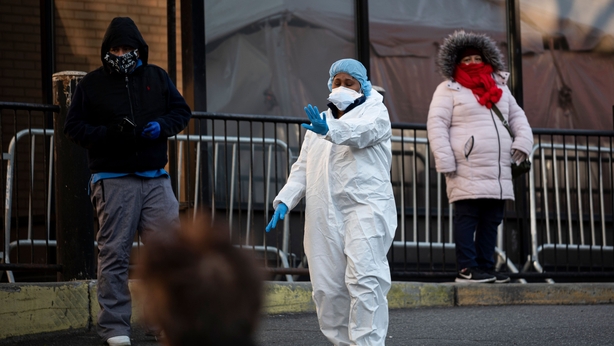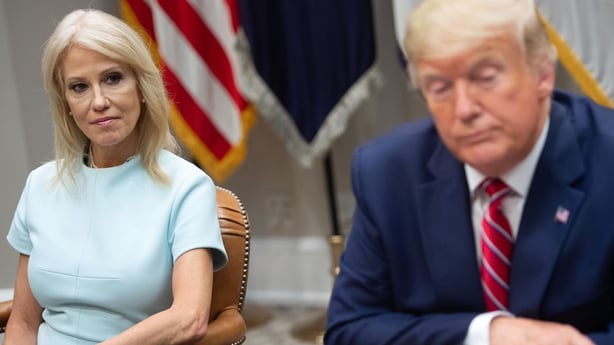New York Governor Andrew Cuomo has said he will work with the neighbouring US states of Connecticut and New Jersey on a joint programme to trace the contacts of people exposed to the coronavirus outbreak to try to prevent further spread.
The ambitious effort to investigate cases in the state at the epicentre of the US crisis will be led by Michael Bloomberg, the former mayor of New York City and a former presidential candidate, Mr Cuomo told a daily briefing.
Many residents of Connecticut and New Jersey commute to jobs in nearby NYCew York , increasing their risk of contagion. Mr Bloomberg would make a financial contribution of "upward of $10 million", Mr Cuomo's aide Melissa DeRosa said.
With coronavirus-related hospitalisations trending lower in New York, Mr Cuomo has turned his attention to the challenge of widespread testing and tracing, both of which he said are key to getting New Yorkers back to work.
Mr Cuomo said the three states have been working as part of a larger regional coalition to coordinate reopening their economies.
"It's best to do this tracing on a tri-state area. Why? Because that's how our society works, the virus doesn't stop at jurisdictional boundaries," he said, requiring an "army" of thousands of people for the initiative.

Mr Cuomo said hospitalisations for Covid-19 fell below 16,000 yesterday, declining for the ninth straight day.
Intubations also continued falling, while the state had 474 additional deaths yesterday, the lowest daily total since 1 April.
Mr Cuomo said now was not the time to be "reckless" and reopen his state too quickly, warning that a significant increase in contacts between people would lead to a rise in hospitalisations in a matter of days.
"We are in a relatively good place in downstate New York," he said at his daily news briefing. "The curve is on descent, the question is now how long is that descent."
The US Center for Disease Control and Prevention (CDC) has reported 802,583 cases of the coronavirus, an increase of 26,490 from its previous count, and said the number of deaths had risen by 2,817 to 44,575 nationwide.
The CDC reported its tally of cases as of 21 April, compared with its count a day earlier.
The CDC figures do not necessarily reflect cases reported by individual states.
Meanwhile, a county health official said coronavirus circulated in January in California, weeks earlier than thought, and early deaths were likely mistaken for the flu.
A 57-year-old woman had died of Covid-19 on 6 February, far earlier than any other reported cases in the United States, said Sara Cody, the health officer in Santa Clara County, California.
It was previously thought that the first US death from Covid-19 was in Washington state on 29 February.
News of the deaths in California could improve public health officials' understanding of how the outbreak took hold in the United States.
Executive order delay
President Donald Trump might delay approving a plan to temporarily halt giving foreigners permanent residence in the United States which he says will protect American workers during the coronavirus pandemic, an aide said.
White House adviser Kellyanne Conway said lawyers were poring over the details of an executive order that Mr Trump had planned to sign today.
The order would have suspended the process to grant foreigners "green cards" for permanent residence.

"It has to be cleared legally," Ms Conway told reporters. "I know he's itching to sign it, but it's a matter of when it's ready," she said.
A White House official who requested anonymity to discuss the process also suggested the timeline for the order could be pushed back.
"The lawyers are still hacking it out and getting down to the details," the official told Reuters. "We don't know if it's going to be ready for signature tonight. It's a complex thing."
Stimulus Spending
Senate Republican leader Mitch McConnell said he would like to pause and assess the effects of the trillions of dollars in coronavirus stimulus spending so far before considering assistance to state and local governments.
"Before we make that decision we're going to weigh the impact of what we've already added to the national debt and make certain that if we provide additional assistance for state and local governments it's only for coronavirus-related matters," Mr McConnell said in an interview with Fox News Channel.
His comments come as the US House of Representatives expects to pass a nearly $500 billion coronavirus relief bill tomorrow but will put off any decision on changing its voting rules during the pandemic, avoiding a potential partisan fight.
The bill, which will provide funds to small businesses and hospitals struggling with the economic toll of the pandemic, is expected to be the fourth coronavirus measure passed by Congress, boosting the overall federal financial response to almost $3 trillion.
Democratic House Speaker Nancy Pelosi backed away from calling for a vote on a measure that would allow members to cast proxy votes on colleagues' behalf during the crisis to promote social distancing and limit the risk of members being exposed to the virus, politicians and aides said.

